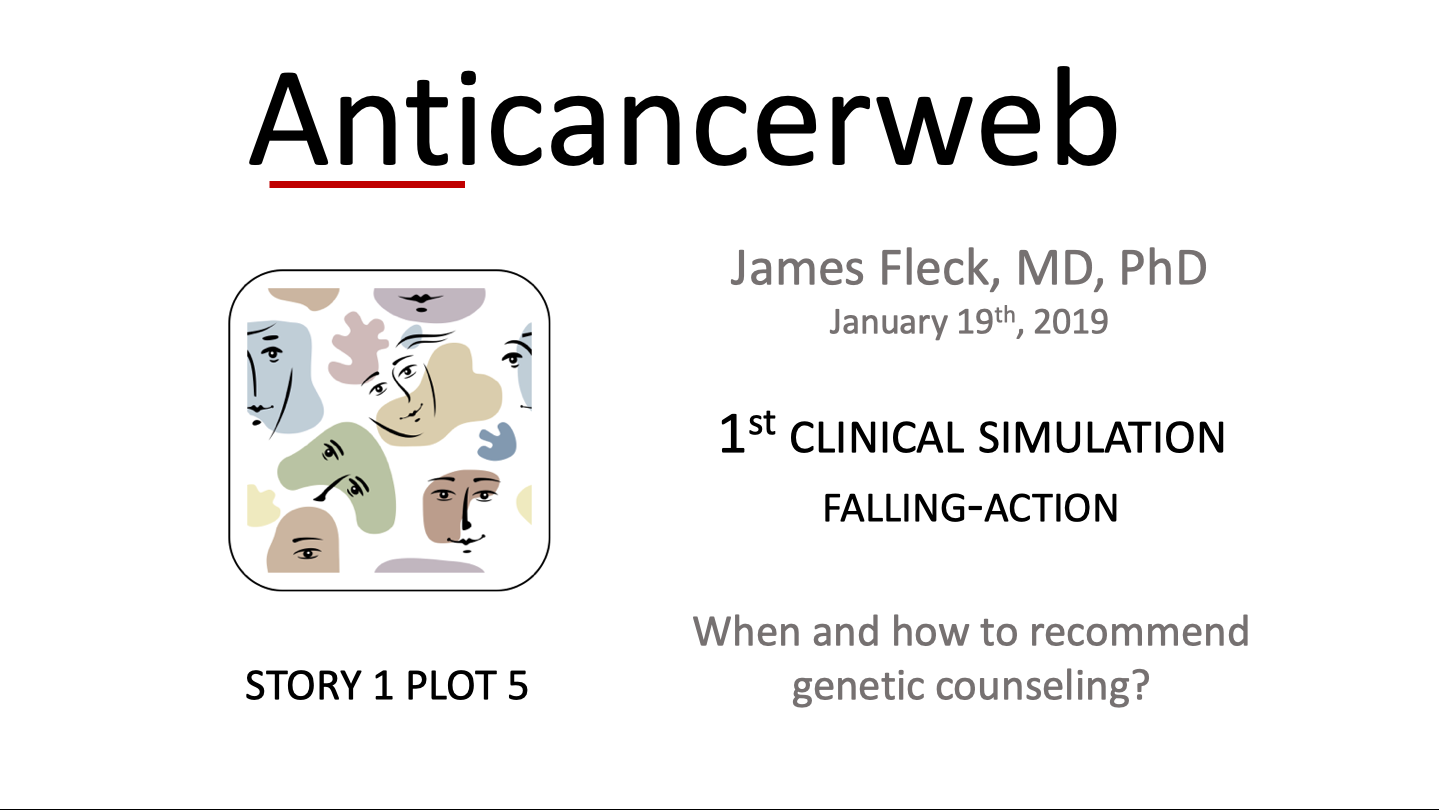
The Internal Enemy | Falling-action
Genetic counseling
(Fictional narrative by the doctor)
James Fleck, MD, PhD & João A de Andrade, MD
Anticancerweb 19 (01), 2019
By the time Ruth completed adjuvant chemotherapy and was starting breast radiation therapy, she asked me for more information about genetic counseling. She was concerned about her two daughters having an increased risk of developing breast cancer. She mentioned that she was finally dealing better with the burden of having breast cancer and felt ready to focus on her children’s future.
I was waiting for the right time to address this important and delicate question!
She had been diagnosed at an uncommonly young age. Furthermore, Ruth had previously mentioned two aunts that had breast cancer. Additionally, when I took her family history, I learned that a grandfather died of pancreatic cancer.
All these facts are very relevant to estimate the hereditary risk of breast cancer.
However, even if one’s risk is higher than the general population’s, it is not a sentence!
A patient should be well prepared and well informed to address the issue of hereditary risk of cancer. Genetic counseling is usually the first step to estimate such risk. Most breast cancers are sporadic and patients should be advised, through a process of shared decision making, about the consequences of the genetic evaluation. Less than 10% of breast cancer patients have a BRCA1/BRCA2 type mutation. The finding of one of these relatively rare mutations will lead to a series of recommendations, varying from surveillance with periodical breast MRI all the way to prophylactic bilateral mastectomy + bilateral salpingo-oophorectomy, which are aggressive and potentially emotionally devastating interventions, especially for a young woman.
There are at least five very well-crafted sets of guidelines addressing the selection of breast cancer patients for genetic screening. I usually recommend the one developed by the National Comprehensive Cancer Network(NCCN), since it is based on qualitative data and easier for patients to understand.
Ruth’s aunts came from different sides of her family. At the time of diagnosis, they were older than 60 years of age and both had hormone-receptor positive breast cancer. One of them was still alive twenty years after the diagnosis. The other one died of a stroke without evidence of cancer relapse. Ruth was not harboring a triple-negative breast cancer, which is usually the molecular type most often related to a hereditary risk. Additionally, her grandfather had a very aggressive pancreatic cancer. At the time of diagnosis, he already had extensive metastatic disease and survived only five months despite chemotherapy. Recent data has shown that the BRCA1/BRCA2 mutation is usually associated with less aggressive forms of pancreatic cancer.
Ruth was initially interested in the BRCA direct-to-consumer test (B-DTCT), which was recently approved by the U.S. FDA. She believed that genetic counseling was a very simple process and that she would have immediate and clear answers once the necessary testing was completed.
Unfortunately, it is not that easy!
B-DTCT is an interesting resource, however it tests only for three BRCA “founder mutations” that were originally identified in Ashkenazi Jewish populations. Ruth’s family history would require a complete multigene panel testing, which should be conducted by a board-certified Genetic Counselor. Either positive or negative results would have a lot of personal, ethical and legal implications. Ruth realized that she was not dealing just with her own health…Her genetic testing would have consequences for both present and future generations of her family.
Despite these concerns, Ruth decided to move forward!
Genetic counselling is a new area of Medicine that deals with risk estimation. Quantitative algorithms that help with patient selection for testing are already available. Unfortunately, the available tests still may lead to uncertainty and require continued monitoring of the patient.
Ruth was well aware of these limitations. After three months of genetic counseling she agreed to go ahead with a multigene panel test. Her rationale was based on her desire to estimate her risk for contralateral breast, ovarian and peritoneal cancers. It would form the basis for future decisions. She felt very comfortable with the idea of screening the contralateral breast. However, she was not satisfied with the low accuracy rate of the blood test (CA-125) and/or vaginal ultrasonography for early diagnosis of ovarian cancer. She also wanted to be able to better estimate her daughters’ risk so they could be better prepared for the future.
Fortunately, all of Ruth’s tests were unequivocally negative!
I was again very impressed with her rational behavior and emotional steadfastness. Facing adversity, she decided to fight and refocused her life’s priorities. She went on to complete the treatment schedule with 100% of the planned dose and had only minimal side effects. As soon as she felt safe, her children’s health and future became her focus.
Last time I saw Ruth she was very happy! She had finished the adjuvant treatment six months prior. She had no complains, was very confident and had no evidence of residual disease. She was working full time again and started to write a book about patient protagonism on cancer care.
To be continued in PLOT 6 (resolution): A multidimensional medical approaching
* Attention: The story 1 was published sequentially from the PLOT 1 to the PLOT 6, however it will appear backwards. So, you will always see the most recent publication. Just browse back in the numbered pages located at the bottom of the homepage and start to read story 1 from the beginning.
© Copyright 2019 Anticancerweb
James Fleck, MD, PhD: Full Professor of Clinical Oncology at the Federal University of Rio Grande do Sul, RS, Brazil 2019
Joao A. de Andrade, MD: Professor of Medicine and Chief Medical Officer, Vanderbilt Lung Institute, Vanderbilt University Medical Center, Nashville, TN – USA 2019 (Associate Editor)

Please login to write your comment.
If you do not have an account at Anticancerweb Portal, register now.